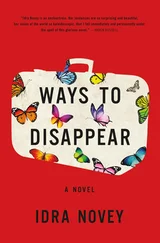“But should I pick the one with pâté?”
“Yes, pick that one.”
She sets an hors d’oeuvre with pâté on her plate and looks around. “But the others are taking two pieces at a time, two different pieces.”
“You can do that too.”
“But what other one should I pick?”
I consider this other woman whom Bernard loves. Even before we began our relationship, he told me that Lærke had a hard time making decisions, so she needed help. For instance, her mother made a deck of index cards with different combinations of clothes and shoes, and every morning, Lærke draws a new card from the deck and puts on the clothing listed on the card. That way, she doesn’t end up wearing clothing that clashes, plus she saves a lot of mental energy that she’ll really need later in the day.
And whenever they’re at a restaurant, Bernard’s trained her to choose the first entrée on the menu. With dozens of little tricks like these, their everyday life has become more normal.
But there’s no menu here. “You could take the tuna salad,” I find myself say a little too loudly as I point across the table.
She immediately does what I suggest, without answering or looking at me. And without another word, she hands her plate to Bernard, so that she can move away from the buffet on her crutches.
What did I just do? I hold my breath, not daring to look at Bernard. Was I nice to Lærke? Was I mean? Did I cross some line?
I skirt my way around retired department heads from Justice and their wives, around Solveig’s and Torben’s family members, and around the very different sorts of friends that Solveig and Torben have acquired in recent years: brain-damaged men and their wives.
One woman, who I know is from the Danish Stroke Association, is helping her husband sit down in a corner of the sofa; his injury must have affected his appetite regulation, for his sport coat hangs off him like a flag. Another woman, whom I’ve seen twice at the Center for Brain Injuries, holds her husband’s glass while he drinks from it.
Without Bernard, Lærke’s world would crumble. So would mine.
I go up the stairs, peer into Solveig and Torben’s large bright bedroom — the queen-size bed with a cream-colored spread, still made up for two — and continue on to the room that was once Torben’s office. The walls are lined with dark wooden bookcases, filled with books and folders on politics, economics, and law. But the books have all been shoved to the back, and in front of them on the shelves stands trash that Torben’s discovered on his walks around the pleasant residential streets of this neighborhood. On the floor squat some filthy plastic supermarket bags, filled to the brim. In one corner there’s a sundial, and on the desk a potted fern that takes up a third of the desktop and clearly doesn’t belong. And on the seat of the dark overstuffed leather sofa, he’s placed an old TV set.
There’s also an empty guestroom up here. Can the door be locked from inside? No, but I try placing a chair so the backrest blocks the handle from turning. It works. I shake and pull on the handle; the door won’t budge. Then I remove the chair, open the door, and walk back downstairs.
In the living room, Bernard is now sitting by a coffee table with Lærke, Andrea, and Ian.
As I approach, I hear Lærke say, “I never want to die. Death is so sad, don’t you think?” She’s addressing Ian’s crustacean features. “Torben, who’s dead … it’s so sad … yes, really sad, don’t you think?”
When she discovers me, she tries to wave me over to one of the seats.
I stand behind Bernard and say that I’ll be back later, there’s someone I need to talk to from the Brain Injury Association. I walk away, and as I pass behind Bernard, I let my right index finger slide along one shoulder, across his nape, and out along the other shoulder.
Then I go back up to the guestroom without a backward glance.
A short while later he’s standing in the doorway.
I hurry over to him, close the door behind him, and kiss him while holding it shut with my foot.
The chair underneath the handle, depress it a couple of times and yes, the chair jams the door fast and then we’re onto the bed. A few minutes; the others outside. Panties off, dress up. Two in the morning and we’re in the toilet together in the rear of some small dark dive. Together in broad daylight behind a hedge at Farum Tennis Club.
We can do anything. Anything, anything, anything. We can start our own family and none of our kids will ever become like the people here. We stand with our beautiful children in our sun-drenched yard in Brede, the lawn sloping gently down toward the woods, the skies stretching wide above us, the inevitability of Nature blessing us.
Someone pulls at the door, but the chair keeps them out. It’s secure. No, it falls, landing with a quick hard bang. The door opens; a face. It shuts again.
“Shit!”
“Who was that?”
“I don’t know!”
“No, no, no!”
Someone’s feet clatter rapidly down the stairs. If Lærke hears about this … My panties on the floor. Bernard’s jacket on a chair.
We rush around the room getting our clothes back on, and as we do we can hear the conversation at the wake stop dead in the living room beneath us.
“Where are you running?” someone asks loudly in the silence. “What’s the matter?”
It remains quiet. Everyone must be looking at whoever’s rushed down the stairs. “There are two upstairs who are running!” a man shouts.
“They’re running?”
“Yes … no. They’re running! Oh … no, no!”
“They’re not running?”
“No.”
“So what are they doing?”
“They’re running! No, no! They aren’t. Running … running. That’s what they’re doing! Oh yes! They’re running! … No, no, they’re not running.”
“Who?” asks another voice.
“I don’t know. I haven’t run them before.”
“You don’t know?”
Someone asks, “Is it Rikke?”
“No, it’s not Rikke. It’s her that’s running and is Rikke, and he’s running Rikke. They’re running together!”
The man’s getting more and more worked up because no one understands him.
“Upstairs! Rikke — running!” he shouts. “No, not running. Not Rikke. They’re running! They’re not running!”
A woman’s gentle voice says, “You end up repeating the words we say, don’t you?”
“Don’t, don’t. I end up repeating them. Don’t. Running. I want to say running. No, not running. Oh, oh. Not running they’re running.”
By now, Bernard and I are out of the guestroom, but soon the man will find his way to the right words. We hear another woman’s voice; it must be his wife.
“We just have to be quiet for a bit. Then he won’t have any words to repeat, and then he’ll find the right words himself.”
And the man yells, “Upstairs they’re repeating! They’re repeating words! Rikke! Oh oh! They’re lying down and repeating words!”
It’s been three weeks since Torben’s wake, and I’m starting to think that Frederik might stand a chance in court after all.
The papers say that a jury’s sentenced a father who murdered his two children to psychiatric treatment instead of life in prison. In doing so, the jury went against the recommendation of the Medico-Legal Council. If it can happen to a child-murderer, it can happen to Frederik as well.
Bernard and Frederik have always thought such a verdict possible, and now I’m beginning to think so too. From the police, Bernard’s obtained logs of all Frederik’s phone calls from the past four years. He’s had an assistant enter the numbers and call times into several enormous spreadsheets to demonstrate statistical changes in who Frederik called, when he called them, and how long they spoke. The numbers should provide some objective proof that Frederik became a completely different person during these years, whose telephone habits changed radically.
Читать дальше



![Ally Carter - [Gallagher Girls 01] I'd Tell You I Love You But Then I'd Have to Kill You](/books/262179/ally-carter-gallagher-girls-01-i-d-tell-you-i-lo-thumb.webp)








